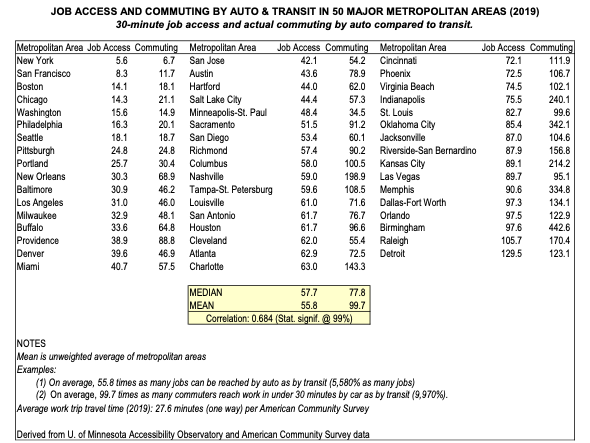For some years, the University of Minnesota’s Accessibility Observatory has produced major metropolitan area job access estimates for the average worker, at various trip lengths and modes. Estimates are provided for all the nation’s 53 major metropolitan areas (over 1,000,000 million), with the exception of Grand Rapids, Rochester and Tucson.
The data indicate auto access to jobs is far greater by car than by transit. This is shown below at the 30-minute job access level, which is slightly more than the average one-way work trip travel time of 28 minutes (about 60% of US workers reached work in 30 minutes), according to the American Community Survey (not counting people who work at home, who have no work trip travel time). At the median, cars can access, on average, 57.7 times as many jobs (5,770% as many jobs) as transit within 30 minutes.
The following table shows auto 30-minute access to jobs in relation to 30-minute access by transit, in terms of auto commuters per transit commuter. The table also indicates actual commuting patterns, express in the actual number of 30-minute auto commuters per 30-minute transit commuter, again from the 2019 American Community Survey. There is a strong correlation between the modeled 30-minute job access and the actual 30 minute commute data (0.686, statistically significant at the 99% level of confidence).

View or download a PDF of the table (link opens in new tab)
Finally, transit ridership has plummeted during the pandemic and has recovered far more slowly than other modes of transport, including driving and air (which are now between 80% and 100% of their pre-pandemic levels as well as Amtrak and transit, which are between 50% and 60% of their previous levels, according to Randal O’Toole. With the future of transit ridership uncertain, especially due to the massive increase in hybrid and remote working and a residual fear of proximity (infection), the car advantage could widen.
Wendell Cox is principal of Demographia, an international public policy firm located in the St. Louis metropolitan area. He is a founding senior fellow at the Urban Reform Institute, Houston, a Senior Fellow with the Frontier Centre for Public Policy in Winnipeg and a member of the Advisory Board of the Center for Demographics and Policy at Chapman University in Orange, California. He has served as a visiting professor at the Conservatoire National des Arts et Metiers in Paris. His principal interests are economics, poverty alleviation, demographics, urban policy and transport. He is co-author of the annual Demographia International Housing Affordability Survey and author of Demographia World Urban Areas.
Mayor Tom Bradley appointed him to three terms on the Los Angeles County Transportation Commission (1977-1985) and Speaker of the House Newt Gingrich appointed him to the Amtrak Reform Council, to complete the unexpired term of New Jersey Governor Christine Todd Whitman (1999-2002). He is author of War on the Dream: How Anti-Sprawl Policy Threatens the Quality of Life and Toward More Prosperous Cities: A Framing Essay on Urban Areas, Transport, Planning and the Dimensions of Sustainability.












